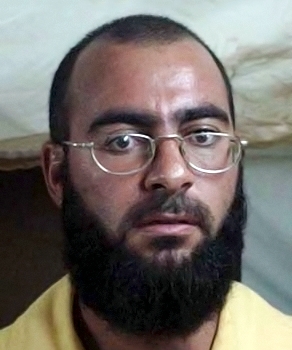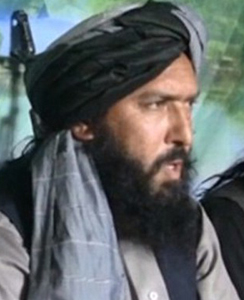Related Research Articles

Abu Bakar Ba'asyir also known as Abu Bakar Bashir, Abdus Somad, and Ustad Abu is an Indonesian Muslim cleric and leader of Jamaah Ansharut Tauhid.
Ali Moussa Al-Shawakh, known by his kunya Abu Luqman, Abu Ayyub al-Ansari or Ali al-Hamoud, was a Syrian man and the Islamic State of Iraq and the Levant governor of Raqqa, Syria as of July 2015. He used to be governor of Aleppo province.

The Islamic State (IS), also known as the Islamic State of Iraq and the Levant, Islamic State of Iraq and Syria, and by its Arabic acronym Da'ish or Daesh, is a militant Islamist group and former unrecognized quasi-state that follows the Salafi jihadist branch of Sunni Islam. It was founded by Abu Musab al-Zarqawi in 1999 and gained global prominence in 2014, when it drove Iraqi security forces out of key cities during the Anbar campaign, which was followed by its capture of Mosul and the Sinjar massacre. In Syria, the group conducted ground attacks against both Syrian government forces and Syrian opposition factions. By the end of 2015, it held an area that contained an estimated eight to twelve million people and stretched from western Iraq to eastern Syria, where it enforced its interpretation of Islamic law. ISIL was estimated at the time to have an annual budget of more than US$1 billion and more than 30,000 fighters.

Abu Bakr al-Baghdadi, was an Iraqi militant and the first caliph of the Islamic State from 2014 until his death in 2019.
Rustam Asildarov (Aselderov) (9 March 1981 – 3 December 2016), also known as Emir Abu Muhammad Kadarsky, was the leader of the Islamic State of Iraq and the Levant (ISIL) North Caucasus branch, and a former leader of the militant Caucasus Emirate's Vilayat Dagestan wing.
Jamaah Ansharut Tauhid or Jemaah Anshorut Tauhid is a splinter cell of the Jemaah Islamiyah (JI) designated as a terrorist organization by the United Nations and the United States. The latter is most known for perpetrating the 2002 Bali bombings along with Dr. Azahari and Noordin M. Top, both Malaysian terrorist kingpin.

Tarkhan Tayumurazovich Batirashvili, known by his nom de guerreAbu Omar al-Shishani or Omar al-Shishani, was a Georgian-Chechen jihadist who served as a commander for the Islamic State, and was previously a sergeant in the Georgian Army.

Abdulrahman Mustafa al-Qaduli, better known by his noms de guerre Abu Ala al-Afri and Abu Ali al-Anbari, was the governor for territories held by the Islamic State of Iraq and the Levant (ISIL) in Syria. Considered the ISIL second-in-command, he was viewed as a potential successor of ISIL leader Abu Bakr al-Baghdadi.

The military of the Islamic State is the fighting force of the Islamic State (IS). The total force size at its peak was estimated from tens of thousands to over two hundred thousand. ISIL's armed forces grew quickly during its territorial expansion in 2014. The ISIL military, including groups incorporated into it in 2014, openly operates and controls territory in multiple cities in Libya and Nigeria. In October 2016, it conquered the city of Qandala in Puntland, Somalia. It conquered much of eastern Syria and western Iraq in 2014, territory it lost finally only in 2019. It also has had border clashes with and made incursions into Lebanon, Iran, and Jordan. ISIL-linked groups operate in Algeria, Pakistan, the Philippines, and in West Africa. In January 2015, ISIL was also confirmed to have a military presence in Afghanistan and in Yemen.
Tariq bin al-Tahar bin al-Falih al-'Awni al-Harzi, also known as Abu Umar al-Tunisi, was a Tunisian man and senior leader of the Islamic State.
Tarad Mohammad al-Jarba, better known by his kunya Abu Muhammad al-Shimali, was an Iraqi-born citizen of Saudi Arabia and a senior leader of the Islamic State of Iraq and the Levant (ISIL).

Hafiz Saeed Khan, also known as Mullah Saeed Orakzai, was an Islamic militant who served as the Islamic State emir for its Khorasan province, which is active in Afghanistan and Pakistan, from January 2015 until his death in July 2016. Prior to 2015, Khan was a senior commander in the Tehrik-i-Taliban Pakistan and initially a member of the Afghan Taliban.
Muwaffaq Mustafa Mohammed al-Karmoush, known by his kunya Abu Saleh al-Afri, was an Iraqi man and senior financier for the Islamic State.
Nasir Muhammad 'Awad al-Ghidan al-Harbi, known by his kunya Abu Bilal al-Harbi, was a Saudi Arabian citizen who was the governor of the Islamic State's branch in Yemen.
Turki Mubarak Abdullah Ahmad al-Binali was a Bahraini Islamic scholar and senior member of the Islamic State of Iraq and the Levant. As head of the Maktab al-Buhuth wa al-Dirasat, "an independent entity concerned with researching Shari'i issues, and issuing fatwas" he had considerable religious influence within the group.
Omar Ali Hussain, also known under the nom de guerreAbu Sa'eed al-Britani, was a British Islamic militant and member of the Islamic State.
Hasan al-Salahayn Salih al-Sha'ari, known as Abu Habib al-Libi, is a Libyan man who has been a senior Islamic State leader in both Iraq and Libya.
Faysal Ahmad Bin 'Ali al-Zahrani is a Saudi Arabian man and senior oil official for the Islamic State.
The history of the Islamic State began with the group's foundation in 1999 by Jordanian Salafi jihadist Abu Musab al-Zarqawi under the name Jamāʻat al-Tawḥīd wa-al-Jihād. In a letter published by the US State Department in February 2004, Zarqawi wrote that jihadists should use bombings to start an open sectarian war in Iraq so that Sunnis from other countries would mobilize against the assassinations carried out by Shias, specifically the Badr Organisation, against Ba'athists and Sunnis. The Islamic State would eventually grow to control territory with a population of millions.
References
- ↑ "Specially Designated Nationals List Update". 29 September 2015. Retrieved 17 July 2016.
- ↑ "Treasury Sanctions Major Islamic State of Iraq and the Levant Leaders, Financial Figures, Facilitators, and Supporters". 29 September 2015. Retrieved 17 July 2016.
- ↑ "NARRATIVE SUMMARIES OF REASONS FOR LISTING". 20 April 2016. Retrieved 17 July 2016.